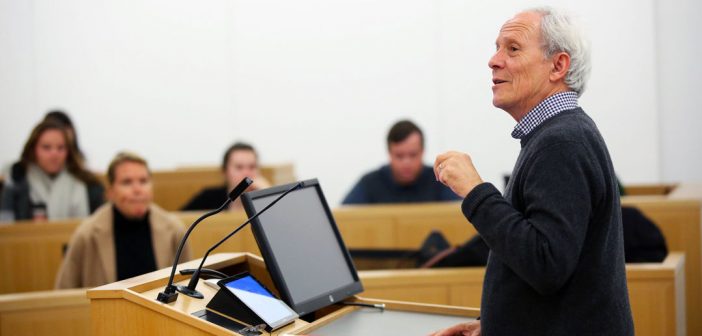Rutgers Faculty Member Moving On Up – New York News

Let’s explore some of the most interesting stories that have emerged from New York business schools this week.
Rutgers Lends Expertise to Newark – Rutgers Business School News
When Newark’s Community Economic Development Corporation lost its chief executive, Mayor Ras Baraka enlisted Lyneir Richardson of the Rutgers Business School to take the reigns. The Rutgers professor the opportunity as an “act of service” and said that he would be thrilled to share his knowledge and ensure that the Newark CEDC continued its vital role in attracting businesses, guiding real estate development and helping to sustain small businesses across the city.
“I’m honored to be of service to the city at this moment of economic energy,” Richardson says. “My temporary role in the city “will bring new relevant examples to my teaching.”
Rutgers University-Newark Chancellor Nancy Cantor remarks:
“Rutgers is a committed stakeholder in the present and future of our great city—not just in Newark, but of Newark—and we are pleased to be able to assist during this critical transition.”
You can read more about Richardson’s role here.
Lessons from Mario Gabelli, Merger Master – Gabelli Connect
Mario Gabelli, Chairman and CEO of GAMCO Investors, Inc, is a legendary “arb” (better known as a risk arbitrageur). He has utilized the discipline of risk arbitrage to successfully invest in companies undergoing mergers, reorganizations and other corporate events. The Fordham University Gabelli School of Business stresses that there is no better discipline that will teach you everything you need to know about deal-making than arbitrage, noting that it teachers investors financial techniques applicable across the financial industry.
“Those things work on everything you do,” Gabelli says.
“It keeps you up-to-date on every financial technique that’s available.” For students, “this is a great business to be in because you learn a lot, it’s not complicated, and you can do it tonight.”
Kate Willing, writer of the recently-published “Merger Masters: Tales of Arbitrage,” asserts: “risk arbs must also have nerves of steel—the discipline to adhere to a strategy, a willingness to tolerate calculated risk, and an ability to make decisions under conditions of uncertainty.”
You can read more from the Gabelli Connect article here.
2018: Year in Review – Lehigh University
Alongside a myriad of learning experiences, research, and huge celebrations on campus, the Lehigh University College of Business and Economics wrapped up an exciting year. Five noteworthy moments in 2018 featured a one billion dollar fundraising campaign, a distinguished Lehigh alumni commencement speech, an outstanding successful wrestling season, discovery of a new geometric shape by a Lehigh professor, and a five-story residential facility.
Deloitte CEO and Lehigh alum Cathy Engelbert says to graduates: “Do what hasn’t been done,” and shared three life lessons at Lehigh’s 150th commencement.

Kicking off its $1 billion campaign, Lehigh announced a generous $20 million gift from Lehigh Board of Trustees Chair Kevin L. Clayton ’84 ’13P and Lisa A. Clayton ’13P.
A new geometric shape: “Team of researchers discover a new shape present in epithelial cells that minimizes energy and maximizes packing stability during tissue bending. The new research can lead to advancement in tissue engineering.”
You can read more about the year that was at Lehigh here.
Financing Strategies For “Nice” People, and More – New York News

Let’s explore some of the most interesting stories that have emerged from New York business schools this week.
When It Comes To Their Finances, Nice Guys Fall Short – Columbia Business School News
According to new research co-authored by Columbia Business School‘s Sandra Matz, “people who describe themselves as ‘agreeable’ are strongly connected to a bleak financial future—including lower savings, higher debt, and a higher likelihood of becoming financially insolvent.”
Matz elaborates, “This research proves that being nice may win friends but it can cost a lot of money. This is especially true for those who start off with less money, as they have no financial safety net to compensate for their personal habits. Unfortunately, having a nice and warm personality—in the arena of business and finances—can often have real financial costs.”
According to the article, “Agreeable individuals perceive money to be less important than their more disagreeable counterparts, and consequently have, on average, worse financial health—which is measured by savings, debt, and default behaviors.”
“Nice Guys Finish Last: When and Why Agreeableness Is Associated With Economic Hardship” was published in the Journal of Personality and Social Psychology.
You can read more about Matz’s research here.
Opportunities Abound in Distressed Debt Investing – Gabelli Connect
The Fordham University Gabelli School of Business recently hosted a talk at its McNally Amphitheatre on the subject of “distressed debt investing,” a multi-trillion dollar industry in which “investors hunt for opportunities where they can purchase debt [with the hope] that the gambit will pay off eventually.”
Attendees were privy to first-hand accounts of distressed debt investments and legal advice from a variety of experts. Baupost Group partner Fred Fogel highlights the “importance of both curiosity and perseverance.” Paul Weiss Bankruptcy and Corporate Reorganization Co-Chair Alan Kornberg “encouraged those just starting out to get a feel for the process by sitting in on bankruptcy hearings.”
Former Wachtell Lipton Bankruptcy Department Head Chaim Fortgang emphasizes the creation and maintenance of “good working relationships.”
You can read more about the talk here.
Look to Entrepreneurs For What’s Next in Healthcare – Johnson Business Feed
The Johnson Business Feed interviewed visiting faculty member Elspeth Murray about the increasing demand for innovation in the healthcare industry, from the use of smartphones to the expansion of ambulatory care.
“Consumer behavior has changed, and that will begin to push on the healthcare system. At a certain point, healthcare practitioners are either going to lose patients or be forced to adopt new ways of treating and accommodating patients.”
She advises students returning to school to focus beyond their specialty and remain “open to taking risks and re-framing your view of the industry, and to be aware of what is happening outside of your bailiwick. Take a good look around at what’s happening and go for it.”
Murray’s 2002 book, Fast Forward: Organizational Change in 100 Days, which she co-authored with Peter R. Richardson, explores how “entrepreneurial thinking gives you the creative ideas and the juice and design thinking helps you see the problems to be solved in the right way.”
Check out the rest of the Murray interview here.
Columbia Research Identifies Customers At Risk, and More – New York City News

Let’s explore some of the most interesting stories that have emerged from New York business schools this week.
Online Companies Beware: New Columbia Business School Research Reveals That Customers With High Activity May Be At Risk Of Leaving the Company – Columbia Business School Blog
Columbia Business School professors Eva Ascarza and Oded Netzer recently published new research that explores how “customers end their relationships with companies in new and unpredictable ways.”
Professor Ascarza writes, “Companies need to understand the ramifications of this paper, because in the digital age, the landscape on customer retention has changed. Unlike the past when a consumer might have had to physically call to end a relationship with a company, today some customers are leaving without saying goodbye.”
Professor Netzer adds, “When it comes to customer retention levels, the most important thing is acknowledging that, in this new hybrid setting, there are indeed two unique types of customers who are at risk of ending their relationship with a company.”
“If businesses want to continue amassing and retaining loyal customers, they need to identify which customers belong in which bucket and then study their individual behavioral patterns so that they can take the appropriate measures to stop them before they walk out that virtual door.”
You can check out the article and the full study here.
Analytics Career Fair Draws Dozens of Recruiters to Meet Business Students – Stevens Institute of Technology School of Business Blog
The Stevens Institute of Technology School of Business Intelligence & Analytics program recently hosted a networking event in which Bed Bath & Beyond VP of Consumer Analytics Melanie Murphy spoke “with dozens of master’s students about how their analytical insights create value in business.”
Of Stevens’ Biz Intelligence & Analytics program, Murphy writes, “The program is so well balanced, from data, to different types of analytics, to the business intelligence perspective—and the students are incredibly smart.”
She adds, “You can tell, in talking with these students, that they’ve had that experience of getting in front of people and sharing ideas.”

Bed Bath & Beyond VP Melanie Murphy (right), talks with Stevens Business Intelligence & Analytics students / Photo via stevens.edu
According to the article, recruiters from Robert Half, L’Oreal, Jefferies, and UBS, among companies, “attended the event to meet and ask questions of students about their research.”
L’Oreal Assistant VP of Human Resources Information Services Gary Winant “brought in a Stevens team to examine turnover in a particular department, and use predictive tools to recommend solutions.”
He writes, “The students here come ready to work. I met with the students twice and was impressed by their commitment. We came back to them three months later with additional questions and even though the project was over, they took the time to respond in detail.”
You can read the full report from this year’s Business Intelligence & Analytics program here.
Graduate Students Provide a Helping Hand for New Business Owners – Gabelli Connect
Fordham’s recent Entrepreneurial Law Clinic was a joint effort between the Gabelli School of Business and Fordham Law, which “brought together students to work on behalf of … social ventures that seek to create positive change in society and companies founded by low-to-moderate income entrepreneurs who otherwise would be unable to afford an attorney.”
One business the Entrepreneurial Law Clinic supported was ConBody, “a boutique gym where New Yorkers learn a workout regime” its proprietor Coss Marte developed in prison. Marte, who received business training at “Defy Ventures, a non-profit that helps formerly incarcerated individuals start businesses,” got legal counseling from Fordham law students and fundraising advice from Gabelli students.
He writes, “They’re absolutely geniuses. They shot me questions that I never really thought about, and I was like, ‘Oh, I should do that.’ They were really on top of their stuff, and really hungry in helping me.”
You can check out the full piece here.
NJ Monthly Mag Highlights Rutgers EMBA Doctors, and More – New York City News

Let’s explore some of the most interesting stories that have emerged from New York City business schools this week.
NJ Monthly Mag Highlights Rutgers EMBA Doctors – Rutgers Business Blog
According to stats released by Rutgers Business School, it’s not uncommon to find between 1-5 doctors in a typical EMBA class. This is largely due to the new reality of the medical profession, which has increasingly required that doctors “transition from medical practice to running hospitals, managing hospital finances, heading-up HMOs, working for pharmaceutical companies and becoming Chief Medical Officers.”
Three Rutgers EMBA Doctors made New Jersey Monthly Magazine’s annual “Top Doctors” list:
- Clifford Sales, a vascular surgery specialist at Overlook Medical Center
- Eric Seaman, a male infertility specialist at the Urology Group of New Jersey
- Jacqueline Williams-Phillips, the medical director of the Pediatric Intensive Care Unit at Bristol-Myers Squibb Children’s Hospital at Robert Wood Johnson University Hospital in New Brunswick and associate professor of Pediatrics at UMDNJ-Robert Wood Johnson Medical School.
Learn more about these EMBA Superstar Doctors here.
Patagonia Exec Talks ‘Fast Fashion,’ Fair Trade, and What It Means to Be A Responsible Company – Gabelli Connect
The Gabelli School of Business‘ Center for Humanistic Management recently hosted a guest lecture from Vincent Stanley, the Patagonia director of philosophy, in which he talked about how corporate responsibility has directly shaped the company’s business.
“One of our big concerns is how we look at the challenges of the planet and ensure that our company is not contributing to those challenges and instead contributing to the solutions. Nature is not just where we go to play. The health of our natural systems underlines all of our social and industrial systems, even in this tiny little town where we were based.”

Vincent Stanley, Patagonia director of philosophy / Photo via fordham.edu
You can read more about Stanley’s lecture here.
Can Stevens Students Create a Cryptocurrency Exchange? Bank on It – Stevens Institute of Technology SOB Blog
A team of Stevens Institute of Technology School of Business seniors recently announced its plans to unveil Coin Complex, a cryptocurrency exchange designed to address and improve upon the limitations of the current trading options, at the May 2 Innovation Expo. George Engroff, a senior finance major who recently completed a summer internship with Credit Suisse, elaborates: “The exchanges I was using were completely inadequate—none of them gave you a good understanding of the market and your portfolio. So I thought, here at Stevens, we have a lot of smart people and innovators—I’m sure we could make a better exchange than what’s out there.”

The Coin Complex login / Photo via Tom Braunck
You can find out more about Coin Complex here.
Cornell’s Business Impact Symposium Returns, and More – New York News

Let’s explore some of the most interesting stories that have emerged from New York City business schools this week.
Cornell Business Impact Symposium: Bridging Sustainability and Enterprise – Johnson Business Blog
Cornell’s SC Johnson Graduate School of Management Center for Sustainable Global Enterprise hosted this year’s Cornell Business Impact Symposium (CBIS), which featured sustainability experts from the food, fashion, technology, and finance industries. Current MBA students shared their takeaways from the symposium on the Johnson Business Blog.
René Bonomi, MBA ’19, cited the “Combating Climate Change with Clean Energy Innovations” panel as a highlight, which surveyed “trends in the energy industry, such as storage improvement, and illuminating innovative start ups such as Dimensional Energy and Energy.”
Sarah Theobald, MBA ’19, was struck by the “From Fashion to Food: Excursions through Sustainable Supply Chain” panel, which “covered an array of hot topics from supply chain traceability and upcycling to the challenges of measuring social impact as well as reconciling emerging market manufacturing practices with United States corporate standards.”

Left to right; Martie Curran (Nestle Waters), Funlola Otukoya (CDP), Eileen Quigley (NRDC), Michael Van Brunt (Covanta Energy), and Jim Armstrong (Climate Changers) / Photo via johnson.cornell.edu
Read more about this year’s CBIS here.
Podcast: Mark Conrad on the Business of Sports – Gabelli Connect
The American sports industry, somehow, is becoming a bigger monolith than ever before. In fact, Forbes projects the professional sports market in the United States to grow from $60 billion to $73 billion by 2019.
Recently, Fordham University Gabelli School of Business associate professor and sports business concentration director Mark Conrad was a featured guest on a Fordham-produced podcast to discuss his organizational predictions for the NFL, Major League Baseball, and NCAA.
You can listen to the interview with Conrad below and find out more here.
A Summer Class Set in Israel – Rutgers Business School Blog
Rutgers Business School Entrepreneurship professor Gary Minkoff has spearheaded a three-week long summer course entitled Doing Business in Israel, which will “introduce students to the entrepreneurial culture and business world inside Israel,” including local Israeli aerospace, artificial intelligence, biometrics, clean technology cybersecurity, pharmaceutical engineering, robotics, and venture investment industries.
“We’re teaching entrepreneurship and innovation, so why not connect students with places where that’s happening. This course aims to plant many seeds for potential collaborations between Rutgers students and Israeli entrepreneurs and innovators,” Minkoff said.
You can learn more about the course here.
Zicklin MBA Ranking Jumps in US News, and More – New York City News

Let’s explore some of the most interesting stories that have emerged from New York City business schools this week.
U.S. News & World Report Names Baruch College Among Nation’s 2019 Best Graduate Schools – Zicklin News
The Baruch College Zicklin School of Business knocked it out of the park in the recently revealed U.S. News & World Report “2019 Best Graduate Schools” list. The full-time MBA ranked 55th nationwide (moving up two spots from the previous year), 29th nationwide among public institutions, first among public institutions in both NYC and New York state, 3rd in NYC overall, and 5th in New York State overall.
The business school’s part-time MBA also ranked 56th nationwide (a 22-spot jump from last year’s list), 34th nationwide among public institutions, first among public institutions in both NYC and New York state, 3rd in NYC overall, and 3rd in New York state overall. Willem Kooyker, Dean of the Zicklin School of Business Dr. H. Fenwick Huss, Ph.D., said in a release:
“Graduates of the Zicklin School of Business lead major businesses around the globe. Our student success is based on an ever-evolving curriculum that today includes data science and analytics, machine learning and cybersecurity along with experiential learning opportunities for real-world problem solving and strategic planning.”
Read more about Zicklin’s showing in the US News & World Report rankings here.
Living Abroad Leads to a Clearer Sense of Self – Columbia Business School Blog
Social scientists from Columbia Business School, Rice, and UNC universities have recently published new research in the journal Organizational Behavior and Human Decision Processes that finds how “living abroad increases “self-concept clarity.”
The findings came after the group surveyed roughly 2,000 “participants from online panels and United States and international MBA programs” that had, at one point, studied abroad.
Entitled “The Shortest Path to Oneself Leads Around the World: Living Abroad Increases Self-Concept Clarity,” the study reveals that “living abroad triggers self-discerning reflections in which people grapple with the different cultural values and norms of their home and host cultures. These reflections are helpful in discovering which values and norms define who people are and which simply reflect their cultural upbringing.”
You can check out the rest of the study here.
Goldman Sachs Executive Recounts Journey to Success in Finance – Gabelli Connect
Goldman Sachs President and Co-Chief Operating Officer Harvey M. Schwartz used his recent Fordham Wall Street Council talk as an opportunity to discuss his unlikely journey from a post-high school gym employee to Wall Street innovator as he stands on the precipice of retirement.
“Innovation is present in financial services. I think that if you have an interest in solving complex problems for clients or specific areas of markets, there is a unique way to participate. The takeaway should be that if you work hard, people will invest in you.”
Glean more wisdom from Schwartz’s talk here.
